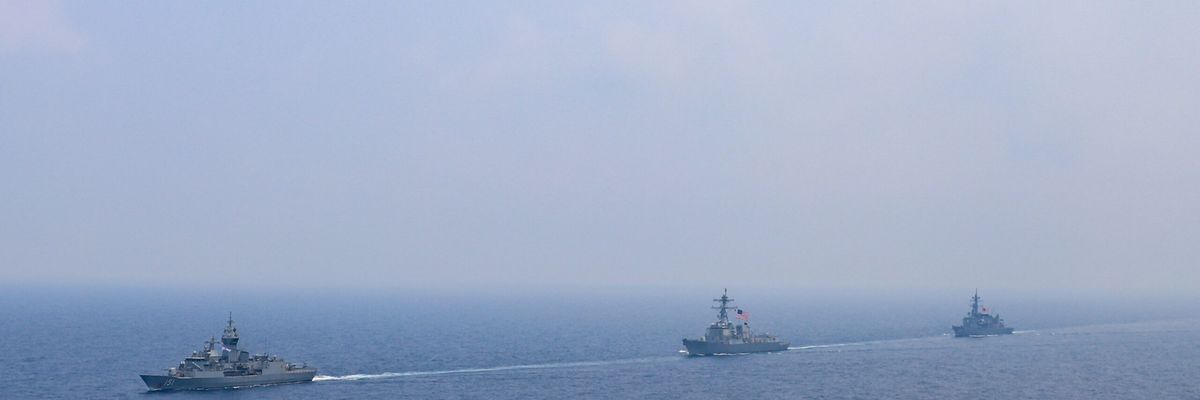Russia’s violent grab at Ukraine and its aftermath have intensified what was an already heated conversation in U.S. strategy and defense circles about the likelihood of a Chinese attempt to take Taiwan by force, and about how U.S. strategy can best deter Beijing from doing so.
The discussion has focused quite naturally on what China might be learning about an attempted seizure of territory and suppression of its people; on what Taiwan might be learning about how and what it needs to fight back, if it comes to that; and on the effectiveness of the West’s strategy of seeking to deter Russia by threatening to impose economic costs through sanctions and other measures.
These subjects deserve attention in order to avoid another unnecessary war. These very focal discussions, however, also have crowded out consideration of the decades-long history of strategic interaction between post-Cold War Russia and the West that preceded February’s invasion, and that might also inform thinking about how to prevent the cross-Strait relationship from devolving into armed conflict.
In Europe, Putin’s oft-expressed perceptions of encirclement were consistently dismissed by the West as invalid. His objections to NATO expansion, especially into Ukraine, were repeatedly rejected on the basis of disallowing him anything even remotely resembling a say-so over alliance membership. It is not apologist to suggest that among Putin’s reasons for launching his war in Ukraine was his recognition that the West was immovable on these matters. It similarly is not accommodationist to suggest that the most important question facing U.S. security strategy in East Asia is whether and how it will address China’s objections to U.S. policy toward Taiwan.
The intensity with which China regards its interest in Taiwan and the seriousness of its intention to hold the United States to limited involvement in cross-Strait relations have long been clear. As established in its one-China policy, the position of the United States for five decades has been to create disincentives for China to act forcibly or for Taiwan to declare independence, essentially underwriting a bilateral resolution to the dispute that is achieved through means other than violence.
China has been meticulous in monitoring U.S. behavior for consistency with the three communiques — founding statements of the one-China policy that limit the scope of acceptable diplomatic and military activities between the United States and Taiwan — and painstaking highlighting each and every U.S. action or arms sale that it believes constitutes a transgression.
Among recent entries on that list have been the sale of F-16 fighter jets, visits to Taipei by senior U.S. officials, and the transiting of U.S. carrier strike groups through the South China Sea. Washington’s view is that the frequency and nature of its diplomacy and the type and volume of its weapons transfers and military activities are consistent with its obligations, calibrated to China’s military development, and necessary to respond to what it sees as Chinese regional adventurism and provocations in the Straits. Both sides, in other words, believe their actions to be justified and their positions righteous.
In international politics, such disagreements are arbitrated on a spectrum. At one end are peaceful diplomatic resolutions and on the other are wars, with a vast middle in between in which discord arises and immediate tensions and strife are managed but not resolved. The geopolitical orientation of Ukraine was a study in this messy middle, with repeated instances of short-term crisis defusion without long-term conflict resolution. The same is true about the status of Taiwan and perhaps even more acutely so, as the island has become the lodestone for the idea of a U.S.-China competition over global order. This adds a pressure to the triangular relationship that makes each interaction increasingly fraught.
The United States certainly can continue trafficking in the middle and persist in its position that China’s grievances about U.S. behaviors toward Taiwan are unreasonable and unfounded. Putin’s invasion of Ukraine, however, should remind Washington that this does not change the fact that they are grievances all the same. So too should it imbue the United States with humility about its ability to predict whether, much less when, Beijing will choose to act on those grievances, or to foresee the course of what follows.
The more desirable alternative is for the United States to remember that Taiwan is not the proving ground for great power competition, and to treat its role in cross-Strait relations accordingly. For 50 years careful and intentional adherence to the boundaries of the one-China policy has done the yeoman’s work of creating and sustaining a peaceful, if uneasy, equilibrium within which Beijing and Taipei can explore strategies for reconciliation.
Operating within this constraint, China has so far been unable to convince the Taiwan people either to capitulate, or that unification is genuinely in their interest. No resolution, therefore, has yet been achieved — and so neither has the overriding U.S. interest in peace in the Straits changed. For the United States to be disciplined in implementing the one-China policy thus is not evidence of appeasement, it is the exercise of strategic patience.














